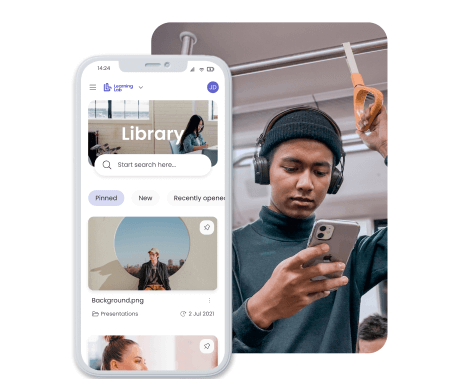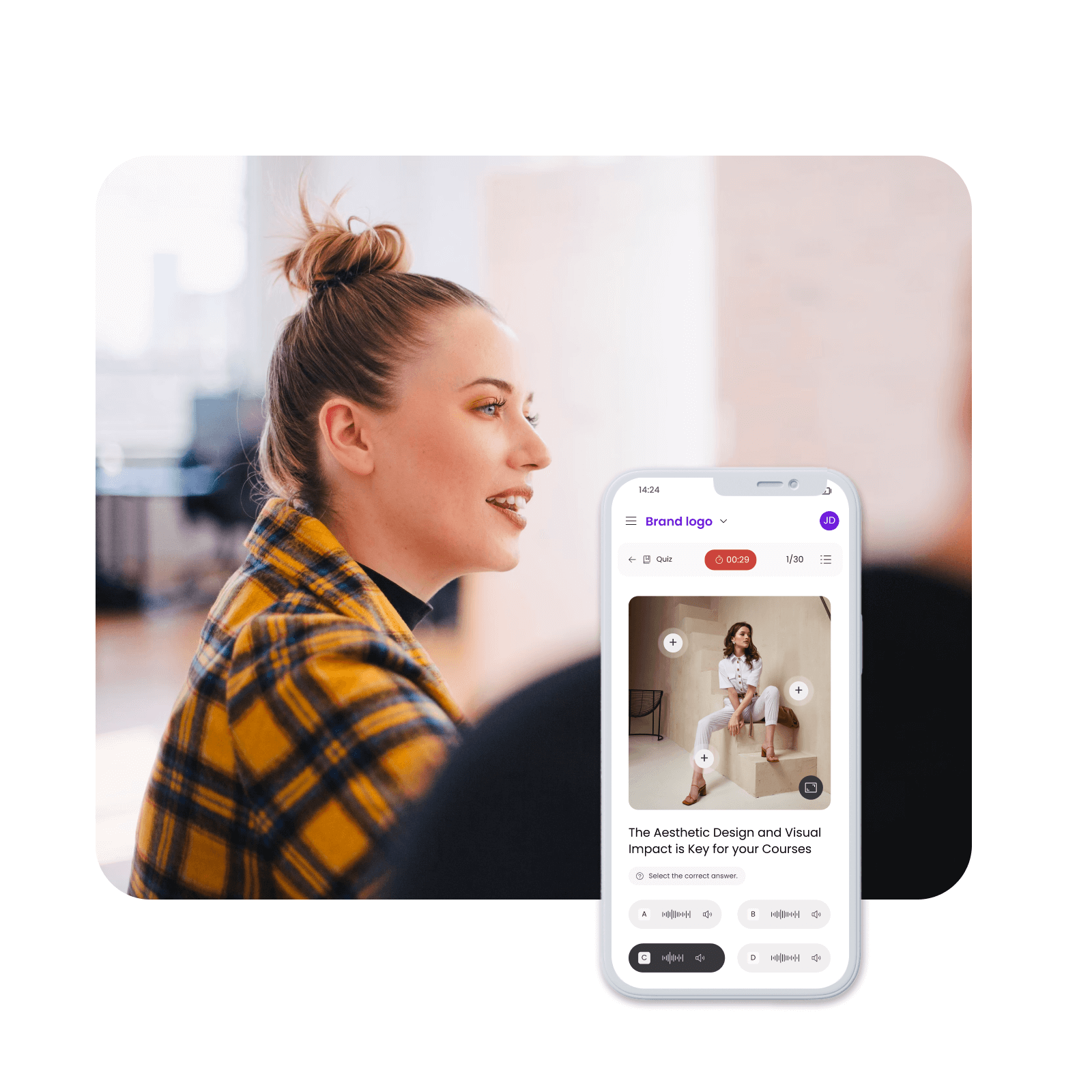Mobile Friendly Learning Platform For Retail Training
Retail first LMS: Mobile Friendly Learning Platform, Learn everywhere!
In retail industry, where training is associated Mobile-Learning, a revolutionary approach to learning is not just beneficial—it's essential.
It is pivotal to adopt a Retail First Learning Management System (LMS), with a mobile-friendly content strategy to meet the unique demands of retail businesses.
This innovative LMS enables learning on the go, allowing employees to access training materials from anywhere, at any time.
Whether on a break, commuting, or directly on the sales floor, Retail First LMS ensures that learning opportunities are just a tap away, seamlessly integrating into the daily flow of retail operations.
This article to the world of mobile-first learning platforms explores how they are transforming the retail landscape by empowering employees with the knowledge and skills needed to excel in their roles, enhancing customer service, and driving business success.
Why you should adopt Mobile First for Retail Training
Adopting a Mobile First approach for retail training is essential, where flexibility and immediacy in learning are key to operational success.
By ensuring information portability and quick access, employees can retrieve training materials instantly, whether they are on the sales floor or in transit, making learning continuous and integrated with daily tasks. Formats specifically adapted to the shop floor, such as job aids and checklists, provide practical, at-a-glance guidance that enhances performance without disrupting workflow.
Also the ubiquity of mobile devices facilitates training across different sites and situations, ensuring consistent learning experiences for employees in various locations. Social learning features are also enhanced through mobile platforms, enabling staff to connect, share insights, and learn from each other’s experiences in real-time, fostering a collaborative learning culture.
Incorporating multimedia formats like video, which can demonstrate skills and techniques visually, and audio or podcasts, which employees can listen to while performing tasks, makes learning more engaging and accessible. This multi-format approach caters to different learning styles and preferences, increasing the effectiveness of the training programs.
A Mobile First strategy is not just an enhancement but a necessity for modern Premium retail training, aligning learning with the dynamic pace and varied environments of retail operations.
Key points:
Information portability and quick access,
Format adapted to the shop floor for job aids,
Cross sites and situations,
Social Learning,
Video format,
Audio and podcast.
Benefits of Mobile Learning for Retail Training
Mobile learning offers significant benefits for retail training, harnessing the power of modern technology to enhance educational delivery.
One of the key advantages is "just in time learning," which allows employees to access training exactly when they need it—be it before a new product launch or immediately before a sales event. This timely access ensures that information is fresh and applicable, maximizing its effectiveness.
Smartphones has virtually guaranteed that all learners have access to training materials on devices they are already familiar with and comfortable using. This removes barriers to technology adoption and integration, making it easier for employees to engage with the material.
Mobile learning puts critical information just one click away, empowering sales staff to assist clients more effectively. Whether it’s accessing product details, or reviewing customer care protocols, employees can retrieve the information they need swiftly and discreetly without leaving the customer’s side.
The ease and speed with which devices can be accessed also significantly enhance learning engagement and retention. Employees are more likely to refer to training materials that are easily accessible, ensuring continuous learning and improvement in their daily interactions and tasks.
This accessibility not only boosts individual performance but also enhances the overall customer experience, leading to better sales outcomes and increased customer satisfaction.
Key points:
Just in time learning,
All learners habe a smartphone,
Information at one click to assist the clients,
Device easilly and quick accessible.
How to design for Mobile Learning
Designing for mobile learning in the retail sector involves several strategic approaches to ensure the training content is not only accessible but also engaging and effective for on-the-go learners. Here are some key points to consider:
Micro and Nano-Learning:
Break down the learning content into small, manageable chunks that can be completed in a few minutes. This microlearning approach suits the fast-paced retail environment, allowing employees to learn in brief bursts between customer interactions. Nano-learning takes this a step further by offering ultra-short lessons that are specific and targeted, ideal for quick refreshers or immediate problem-solving.
Text to Audio Transformation:
Convert textual content into audio formats to facilitate learning on the move. This is particularly beneficial for retail staff who might prefer listening to content while performing tasks, thereby enhancing their ability to multitask effectively without having to fixate on text. Audio learning can be especially effective for conveying concepts that require repetition or memorization.
Video-Based Learning:
Incorporate video-based learning modules that can demonstrate procedures or behaviors more effectively than text or audio. Videos can capture complex retail tasks such as setting up displays or interacting with customers, providing visual and auditory learning cues that enhance understanding and retention.
Font Size and Legibility:
Ensure that all text is readable on small screens. This involves using larger font sizes and high-contrast text and background colors to enhance readability. Remember that your content will be accessed on a variety of devices with differing screen sizes and resolutions, so responsive design is crucial.
User-Friendly Activities:
Design interactive activities that are easy to navigate on a touchscreen device. Use swipes and taps as the primary interaction method, and ensure that buttons and links are of a suitable size for tapping with a finger without causing frustration. Activities should also be engaging and directly related to the learning objectives, providing immediate feedback to keep learners motivated and informed of their progress.
By focusing on these key design principles, you can create a mobile learning environment that is conducive to the dynamic and diverse needs of retail employees, fostering an educational experience that is as flexible and active as they are.
Key points:
Micro and nano-learning,
Text to Audio,
Video-Based Learning,
Font Size,
User friendy activities.
Authoring Tool: Mobile First Design for Retail Training
The integration of a creative authoring tool is crucial for designing Mobile First content for retail training, offering a suite of features that streamline and enhance the development process.
An ideal authoring tool should be intuitive, making online course design easy to manage and update. This accessibility ensures that training materials can quickly adapt to new products, promotions, or changes in business strategy without extensive technical skills.
Branding the learning experience is essential in maintaining consistency across all corporate training materials. This not only reinforces the brand identity but also creates a more immersive learning environment for employees. To support dynamic content creation, the tool should include features like an animated design capability, a design and branded template gallery, and an extensive image gallery, which together allow for visually engaging and instructionally sound content.
Video features are particularly important in retail training, where demonstrating processes or behaviours can significantly enhance understanding and engagement.
Incorporating a project management system within the authoring tool can help training developers coordinate tasks, track progress, and collaborate effectively, ensuring that projects are completed on time and within budget.
Automatic translation capabilities are vital for businesses operating in multiple regions or countries, providing a seamless way to create multilingual training content that ensures all employees receive the same quality of training, regardless of language barriers.
By using a comprehensive authoring tool equipped with these functionalities, retailers can significantly improve the efficiency and effectiveness of their training programs, catering to the modern, mobile-first workforce.
Key points:
Online Course design easy to use, manage and update,
Branding Learning Experience,
Design animated,
Template Gallery,
Image Gallery,
Video features,
Project Management System,
Automatic Translation.
Video-based Learning for Mobile first Training
Video-based learning offers substantial benefits for mobile-first training in the retail sector.
Interactive videos enhance engagement by allowing learners to interact directly with content through embedded questions or decision points, which helps in reinforcing learning objectives.
Video quizzes can be integrated seamlessly within training modules, providing immediate feedback and assessment opportunities to gauge employee understanding and retention.
Video coaching sessions and interviews with experts or seasoned employees offer real-world insights and practical advice, making the learning experience more relatable and effective for new hires.
These features combine to create a dynamic and interactive learning environment that is ideally suited for the fast-paced retail industry.
Key points:
Video Assessment,
Interactive Video,
Video Quiz,
Video Coach,
Interviews.
Mobile-Learning and Social Learning for Premium Retail Training
Mobile learning combined with social learning transforms retail training by leveraging modern communication tools.
Features like audio and video chat enable real-time interaction and immediate problem-solving among team members, fostering a collaborative learning environment.
Forums and discussion platforms further enhance this by allowing for the continuous exchange of ideas and best practices, encouraging a culture of learning and collaboration that extends beyond the confines of traditional training sessions.
Key points:
Audio and video Chat,
Forum,
Discussion and Collaboration.
Mobile Learning and Blended Learning for Retail Training
Mobile learning and blended learning together create a robust framework for retail training, enhancing flexibility and support.
Onsite training management is streamlined through mobile apps, allowing trainers to update and track the progress of in-store sessions instantly.
Training support online complements physical training by providing resources and real-time assistance, ensuring a continuous learning journey.
Mobile devices serve as a crucial link between onsite and online training sessions, enabling a seamless integration that maximizes learning outcomes and operational efficiency in retail settings.
Key points:
Onsite training management,
Training Support Online,
Application to follow up on store training session,
Mobile as a link between training session.
The Learning Lab, Mobile and Retail First Learning Platform
Combining the convenience of mobile accessibility with the comprehensive features of blended and social learning, The Learning Lab LMS emerges as an unparalleled platform for retail training.
It adeptly supports the dynamic nature of retail environments by facilitating just-in-time learning and fostering ongoing collaboration through forums, video chats, and interactive content.
With its seamless integration of onsite and online training management, coupled with the ability to update and track training in real-time, The Learning Lab LMS is uniquely positioned to offer a holistic and effective learning solution.
Our Learning platform not only adapts to the needs of a mobile-first workforce but also enhances the learning experience, making it the best choice for retail organisations aiming to optimize their employee training and development.
Simplify Learning,
Elevate Design.
A fully customised Learning Platform & eLearning Provider
to create branded and engaging training experience.








